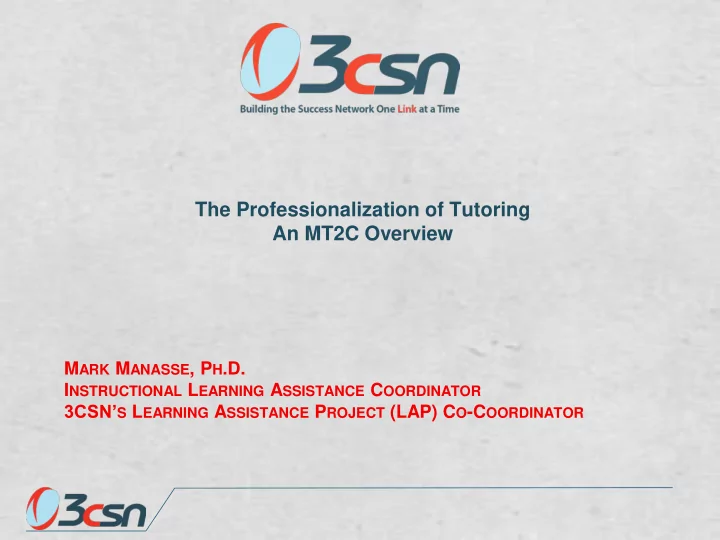

The Professionalization of Tutoring An MT2C Overview M ARK M ANASSE , P H .D. I NSTRUCTIONAL L EARNING A SSISTANCE C OORDINATOR 3CSN’ S L EARNING A SSISTANCE P ROJECT (LAP) C O -C OORDINATOR
3CSN Tutoring Community of Practice: Learning Assistance Project (LAP)
LAP: Vision and Principles Vision: Professionalization of Tutoring (i.e. Tutors are educational professionals) Principles: 1. Training should be rigorous, practical, and sustainable. (Sheets, 2012) 2. Instructors and tutors have different yet equitable roles. (Dawson, et al, 2014) 3. Tutoring is about student empowerment. (Paulson, 2012) 4. Tutoring contributes to student success. [California Ed Code, §88810(a)(5)]
Shared vision of the possible: • If it makes faculty/staff feel engaged and energized, it will do the same for tutors • If tutors see themselves as educators and professionals, they will improve themselves AND deliver better services to students • Tutors are our future colleagues and bosses!
Mesa College MT2C Theoretical Framework for Learning Assistance
Our Goal To Become the Model Tutoring Program in California
2017-2018 Logic Model and Mission Statement
Mission Statement Our mission is to… Promote independent learning and confidence through empowering relationships. Support the learning process by continually creating a welcoming and safe space. Foster a community of learners. At the heart of our mission is cultivating professionalism in order to help students, tutors, staff, and faculty succeed and reach their goals.
Theory of Change If we provide professionalized training on networking as well as engage in action research, community college professionals will transform their environments and identities to create communities of practice (CoPs). These CoPs will produce powerful learning and innovation across the state, which will lead to greater student success. The MT2C believes that this transformation will take place at Mesa College if we share impactful, relevant professional learning with tutors, faculty, staff, & administrators. Then, when we start with our WHY : • Tutors and other learning assistance educators will recognize themselves as empowered professionals who are an integral, equitable part of the institution; • This professionalization of tutoring will yield improved services to our students and contribute to a campus wide culture of student success; • The learning assistance domain will become a more central part of the institution; • Tutors will develop a strong foundation necessary to become successful professionals.
Defining the Educational Professional
Tutoring Cycle
The Expert and Apprentice Relationship
Attending to Four Dimensions of Learning in a Tutoring Session The Learning Apprenticeship Model
Affective Domain Cognitive Domain Adapted from: “The Reading Apprenticeship Framework.” West Ed
Attending to the Whole Student Use of Learning Apprenticeship (LA) as the foundation for tutor training, especially when coupled with the Tutor Cycle (Be Present + Greet Self-Diagnose Tutor Reflect Next Steps) • Establishes a holistic framework • Builds metacognition to strengthen self-awareness • Emphasizes that tutors aren’t • Teaching content or • Giving answers or • Appropriating student work/thinking • Encourages questions and takes a strengths-based, inquiry-based approach • Normalizes and acknowledges confusion I don’t know…yet We don’t know yet. Let’s find out. Together!
Our Rad Team!
Leadership Team
Leadership Team (Tutors, Faculty, Staff) Professional Learning • Fall 16: Back to School • Spring 17: Whistling Vivaldi • Fall 17: For White Folks Who Teach in the Hood and the Rest of Y’all Too • Spring 18: Reading for Understanding • Fall 18: Culturally Responsive Teaching and the Brain
Mentor Tutors • Cooperrider: Appreciative Inquiry • Senge: The Learning Organization • Burns: Transformational Leadership • Schoenback/Greenleaf: Learning Apprenticeship
Tutors Mentoring Tutors • James and Becky: Using Mindfulness and Empathy to Meet Students Where They Are • Niko and Meiko: Armor for Test Anxiety • Kenny and Amanda: Who Are You? How Culture Plays a Role in Education
MT2C All Tutor Training Fall 2017 Examples • Larry, Ailene, and Victoria: Student Services • Erika: High Tech Center/DSPS • Equity, Data, Tutor Cycle, and Learning Apprenticeship Framework • Setting Intentions on Learning Identity and Safe Spaces During a Tutoring Session • Metacognition, Being Present, and the LA Framework • #ThePowerofYet • #LiminalSpaces
Tutors, Faculty, and Staff Conference Attendance
Tutors and Staff Present at Conferences • Jose and Ramzy: A Growth Mindset Through an Interdisciplinary Lens • Niko and Gideon: Code Switching and Linguistic Bias • Mariam and Nicole: A Little off the Top: A Barbershop Model for [CT] Programs • Becky: Working with Nontraditional Student Tutees: Uncovering Assumptions.
Outcomes
Programmatic Recognition ACCJC Commendation The team commends the College’s tutoring services for its committed employees and collaborative team oriented environment that includes professionalized student tutors. (II.B.1,II.B.3) Achieved 3 Levels of CRLA Programmatic Training Certification
Tutors of the Years State and Local Jose Franco Rojo Helena Almassy 3CSN Learning Assistance Project Mesa MT2C Bill Peters California Tutor of the Year Tutor of the Year
MT2C Retreat 2017
2017 Focus • Learning Apprenticeship Framework • SWOT Analysis • Mentor Tutors • Equity Training • Student Services and Faculty Connections
Summary
Where We Are Now MT2C now has…. • Centralized into LRC with growing campus/area partnerships • Expanded Tutoring Services in class, out of class, and online • Expanded Hours, including late night, Friday and Saturday • Expanded Online Appointments and Drop in Appointments • Growing Leadership Team: Tutors, Staff, and Faculty • Developed a Programmatic and Student Success Evaluation Cycle with IR • Thriving Professional Learning Opportunities for Tutors/Staff/Faculty • Programmatic Support for Conference Attendance and Participation • Established stronger social media/website/resources • Created more leadership roles for tutors • Connected to Mesa Programs: Athletes, high schools, vets, CE, CTE, EOPS, DSPS • Aligned our training practices
Questions … about this picture or anything else…
Recommend
More recommend